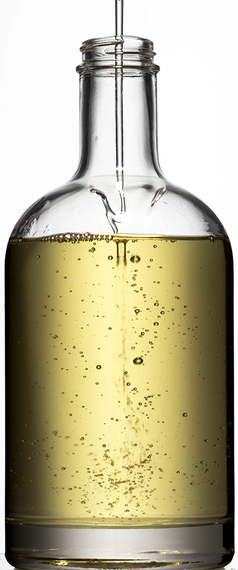By Kristie Dash, Allure
It doesn't take a biophysicist to know that incorporating oils into your beauty routine soothes chapped skin, fights frizz, and combats dryness--especially in the winter. But did you know that different types of oils do different things? If you look under a microscope, some oils are made up of large molecules, while others are made up of smaller ones. And when it comes to getting what you want out of your oil, it turns out size matters.
Most people think that all oils sink into your skin and hair like a leave-in conditioner, but actually only those with small molecules have the ability to truly penetrate the hair shaft and top layer of skin. Coconut oil is the best example of one that does, which is why it's so commonly used in hair masks and body lotions. It has legitimate restorative properties, so you know that soft feeling you get post-use is real.
Most natural oils, however--like argan oil, rose-hip oil, and jojoba oil--are mixtures of fairly large-size molecules, explains cosmetic chemist Jim Hammer. Their purpose is not to sink into your skin and hair but rather to form a layer of protection, especially in wet (read: snowy) or humid weather, for both preventative and cosmetic needs. "These oils spread out and form a thin coating on the hair and skin, which provides softness, smoothing, and shine-enhancing effects," he says. To get even more out of these oils, apply them after the shower when your skin is still damp to trap in the excess moisture. And when it comes to your hair, don't be afraid to go for a heavy coating. "The oil will act as a barrier to keep water getting into the hair, which can help prevent frizz," says Hammer. "It also serves to seal in whatever moisture was originally in the hair."
With this being said, cosmetic chemist Ni'Kita Wilson makes a valid point about argan and other larger molecule-based oils. "I wouldn't go so far as to say that none of them penetrate into the skin. They aren't as efficient as coconut oil, but they have a little penetration power," she says. And when it comes to hair, it's true that size does matter, but as Wilson explains, "Hair strands tend to be a bit battered and abused so there are ways for the oil to penetrate into the hair strands." So yes, there is some debate about what types of oils are most beneficial, but according to the experts, they're all good. Our solution: Use them all.
